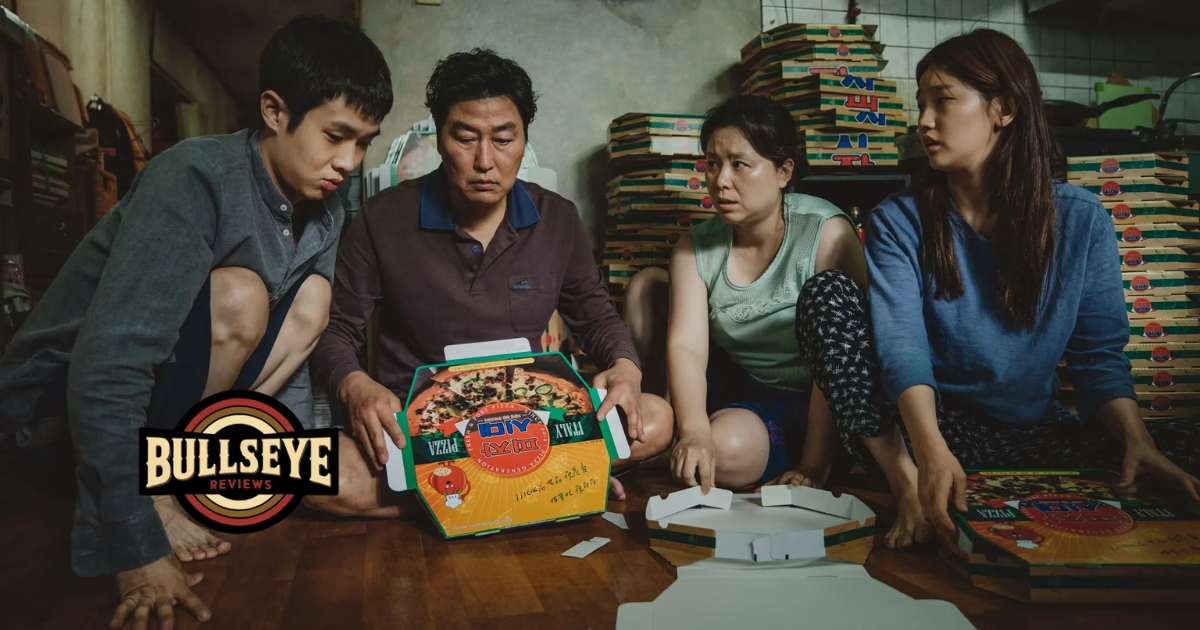A Masterpiece from South Korea That Redefined World Cinema
Bong Joon-ho’s Parasite (2019) is not just a movie—it’s a layered exploration of class, deception, and survival, packed into a genre-bending cinematic experience. Blending satire, thriller, and tragedy with startling ease, this South Korean film became a global cultural phenomenon. It swept the awards season, earning the Palme d’Or at Cannes, and making history by winning four Academy Awards, including Best Picture, Best Director, Best Original Screenplay, and Best International Feature Film.
This is a film that digs deep beneath society’s glossy surface—and what it unearths is disturbing, thrilling, and unforgettable.
Plot: When Two Worlds Collide
The film centers around the Kim family—clever, street-smart, and perpetually broke. Living in a cramped, semi-basement apartment in Seoul, they hustle their way through life folding pizza boxes and piggybacking off their neighbor’s WiFi. When the son, Ki-woo, lands a tutoring job for the wealthy Park family, it sets off a chain of calculated moves. One by one, the Kims insert themselves into the Parks’ pristine household, posing as unrelated professionals—art therapist, chauffeur, housekeeper.
At first, it plays like a clever social con. But as the lines blur between opportunism and survival, the film spirals into darker territory—one where secrets fester beneath marble floors and class tension tightens like a noose.
Themes: Class, Greed, and Human Desperation
A Tale of Two Homes
Parasite isn’t subtle about its metaphor. The contrast between the two families’ homes is architectural storytelling at its finest. The Kim family’s semi-basement—where flooding brings in sewage—is literally and figuratively below ground. In contrast, the Park’s luxurious hilltop mansion represents wealth, detachment, and security. Yet within both homes, there’s a creeping sense of vulnerability.
Who’s the Real Parasite?
One of the film’s most haunting questions is: who’s feeding off whom? The poor exploit the rich through deception, but the rich are equally parasitic—using their wealth to shield themselves from reality and depending on the labor of the underprivileged to keep their world running smoothly.
Performances & Cinematic Brilliance
The ensemble cast is exceptional. Song Kang-ho delivers a quietly devastating performance as the father, Ki-taek, whose growing resentment simmers beneath a forced smile. Park So-dam and Choi Woo-shik are magnetic as the younger Kims, bringing sharpness and energy to every scene.

Cinematographer Hong Kyung-pyo frames the story with meticulous detail, while Lee Ha-jun’s production design turns space into emotion—cramped, dark, open, airy—each room tells a story. The score by Jung Jae-il dances between melancholy and madness, adding depth to every twist.
Not Just a Korean Story
Though rooted in Seoul, Parasite speaks to global audiences because economic disparity, class anxiety, and social resentment are universal. This could be any city. The division between those who have and those who have not is just as present in Mumbai, London, or Los Angeles.
Final Verdict
Bong Joon-ho’s Parasite is one of the most powerful commentaries on modern society ever captured on screen. It’s funny, tense, tragic, and unforgettable. With flawless direction, a brilliant script, and performances that feel real and raw, this film earns its place in cinematic history.
Bullseye Rating:★★★★½ (4.5/5 stars)
A near-flawless cinematic achievement that deserves every bit of praise it has received.

